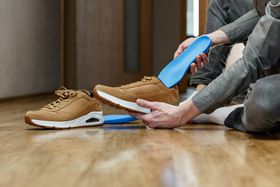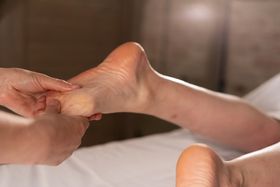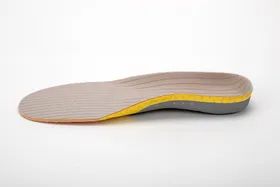How to Know if You Need Arch Support
Updated January 29, 2024

It's important to understand that not everyone needs arch support. If your feet are functioning properly and you don't experience any sense of pain and discomfort while living a regular lifestyle, then you need not worry about spending money on arch supports.
» Will orthotics give me arch support? Peruse Upstep's range of custom orthotics to find a fit that will give you the exact arch support you need
Why You May Need Arch Support
You may want to invest in arch support for any of the following reasons:
Frequent Pressure on Your Feet
If you experience more pressure on your feet than the average person, you have a higher risk of developing foot problems at some point in your life. This extra pressure could come from living an active lifestyle, such as in the case of runners or golfers. It could also be due to demanding and active work schedules, such as that of a nurse or restaurant waiter running multiple shifts. Likewise, being overweight will also put extra pressure on your feet.
Arch support insoles for running or golf will typically not need to be custom designed if the individual is healthy, and the same is true for people working active jobs. Generally, a good pair of arch-support shoes or some over-the-counter (OTC) insoles will help give you some extra support.
Frequent Foot Pain or Inflammation
If you experience foot pain often, especially in the morning or after sitting for a long period, then it could be a sign of plantar fasciitis. This is characterized by an inflammation of the plantar fascia (the thick band of tissue that runs under your foot and connects your heel bone to your toes).
Although plantar fasciitis often goes away on its own, it could be a sign of something more serious. Arch support insoles for plantar fasciitis will either be soft to give some extra cushioning to the painful area or rigid to correct other underlying conditions.
Low or Fallen Arches
Low or fallen arches can be flexible or rigid. Often, flexible flat feet are hereditary and don't need to be treated as they don't cause pain or other problems. Rigid flat feet, however, are most often the cause of injury or congenital disorders and can lead to several other problems, such as pain in the ankles, heels, legs, and lower back.
Orthopaedic arch supports for flat feet will typically be rigid and help create that arch to take the pressure off the other areas of your feet, directly helping your alignment and taking some pain off the lower back and legs. If you suffer from flat feet, then it's likely that you'll need custom-made arch supports as general OTCs won't cut it.
High Arches
High arches put pressure on the outside of your soles and the tendons at the forefoot. This can lead to conditions like plantar fasciitis and metatarsalgia. As such, metatarsal arch supports will take some of the pressure off these tendons and redistribute it around your foot.
Conclusion: Seek Expert Confirmation
If any of the reasons above ring true, it's important you see a podiatrist or a medical doctor for their expert opinion on just what kind of arch support you need based on what you need it for.








